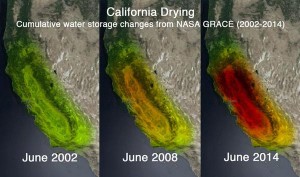
Vasnetov’s Four Horsemen of the Apocalypse
I’m cranky today. A friend asked me about California’s water problems, and I said: “We’ve known for years, and we’ve done essentially nothing.” The problem in California is agriculture. Every Californian could stop drinking and watering their lawns tomorrow, and California still wouldn’t have enough water. California is draining its aquifers, and wells are going dry. Water which took millions of years to accumulate is being drained in years.
Much of California is a desert, and yet we insist on growing food there with water we don’t have. The Colorado river is drained to a trickle feeding California. It’s not that California couldn’t grow food, but much of the food it grows (almonds, for example) requires huge amounts of water.
So this is a problem about which we have known for decades, in one sense; I first read the of California’s drought vulnerability as a child, in a book published in the 1950s. In another sense, it’s come quickly, due to climate change, another problem we’ve known about for decades and done nothing of any significance to stop. In fact, we have accelerated climate change with our policies—neo-liberalism was about shipping production from areas that produced less carbon (advanced industrial nations) to areas that would produce the same goods with more carbon. (Production in China is more carbon intensive than the same production was in the US.)
Everywhere I look, I see problems we know exist which we refuse to fix. Our actual actions often make them worse.
(I am fundraising to determine how much I’ll write this year. If you value my writing, and want more of it, please consider donating.)
In the field of foreign affairs, Western actions since the 1950s, things like overthrowing democratically elected governments, favoring autocracies, funding nasty people like the Taliban, hostility to Nasser, and on and on, reaped the expected result: Democracy, westernization, and modernization has failed in most of the Middle East, and they’ve turned to far nastier ways of running their societies.
In economics, the failures of neo-liberalism were predicted at the time the policies were put into place. I remember the Reagan-Thatcher years, and if you think anyone with sense didn’t know they were about wealth transfers to the rich you are entirely wrong. I read my first “Oh shit, inequality is going to reach Gilded Era levels!” book in 1986. It took longer than the early predictions thought, but it has ground, inevitably, on.
As for resource stagnation, the “Limits To Growth” book was published in 1972. Its baseline exhaustion of limited resources scenario is essentially on track, its larger point that a limited world can’t treat resources as unlimited is also true. Substitution only goes so far. There are two obvious solutions to that problem:
- Planned use of resources, with intense recycling and heavy dependence on management of renewable resources, or;
- Getting into space in a big way to expand the resource pool and put off much of the problem for centuries (at which point, hopefully, we figure out a better solution, or go to the stars).
Ideally you’d go with a combination of these two, but we haven’t pursued either one vigorously. Neo-Luddites on the left constantly sneer at any serious idea of exploiting space while “I’ve got mine, there is no future” douchebags on the right oppose both space exploration and sensible stewardship of the Earth’s resources.
This isn’t a “green” issue, this is a common sense, “we have limited resources” issue. The idea that substitutions can be found for anything is merest faith, an example of the fact that ideologies are far more powerful than mere “reality.” (Until they aren’t, a point usually proved through body counts in the millions, and soon in the billions.)
These are just a few of the “big” items. One could probably list a hundred with ease, starting with the warming and acidification of the oceans, the collapse of ocean stocks, and the great-die-off.
The complete inability of our society to deal with obvious consequences of our actions is what has doomed it. This society will not survive. The questions are only “How many people will it kill going down?” and “What will the next society look like in the ashes of the world left to us by this one?”
Whatever it looks like, it will be very different. I have some thoughts along those lines, which I’ll get to in other articles, but the new society won’t be about the immediate capitalistic gratification of needs that don’t actually exist. If it turns back into that, eventually, I doubt oxygen-based life on Earth will survive, and humanity will only survive if it develops self-sustaining colonies not on Earth.
Little of what is going to happen over the next hundred years will be anything humanity has not done to itself. Our fate was, and still is, in our own hands, and we will reap as we have sowed.


